Engender blog
Engender launches report on how parties can take action to get more women elected
Today, Engender launches our new report “Beyond Promises: What works in getting more women elected”, exploring the use and impact of gender quotas and other Positive Action Measures (PAMs) in Scottish political parties. Find out more about the report below.
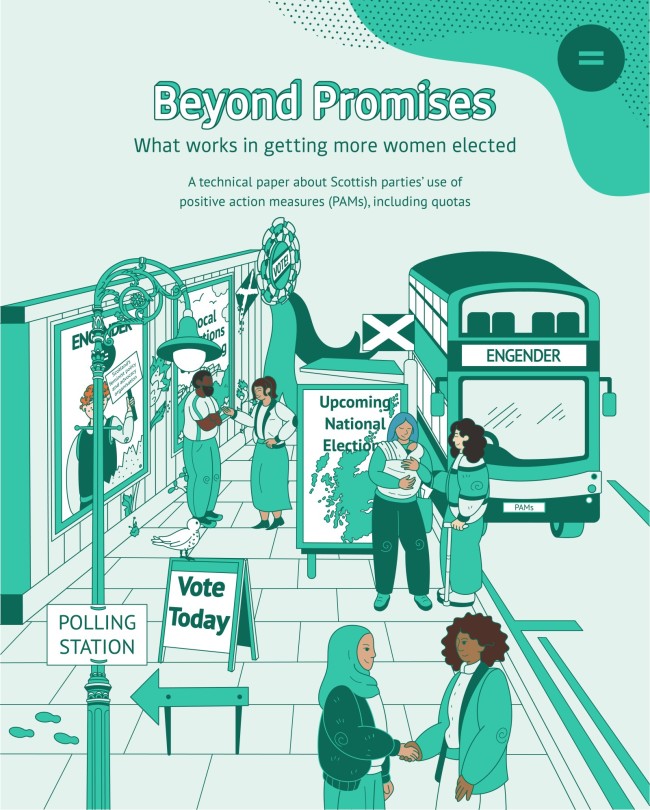
The message is clear: women bring essential perspectives to politics, but they are still being pushed to the margins.
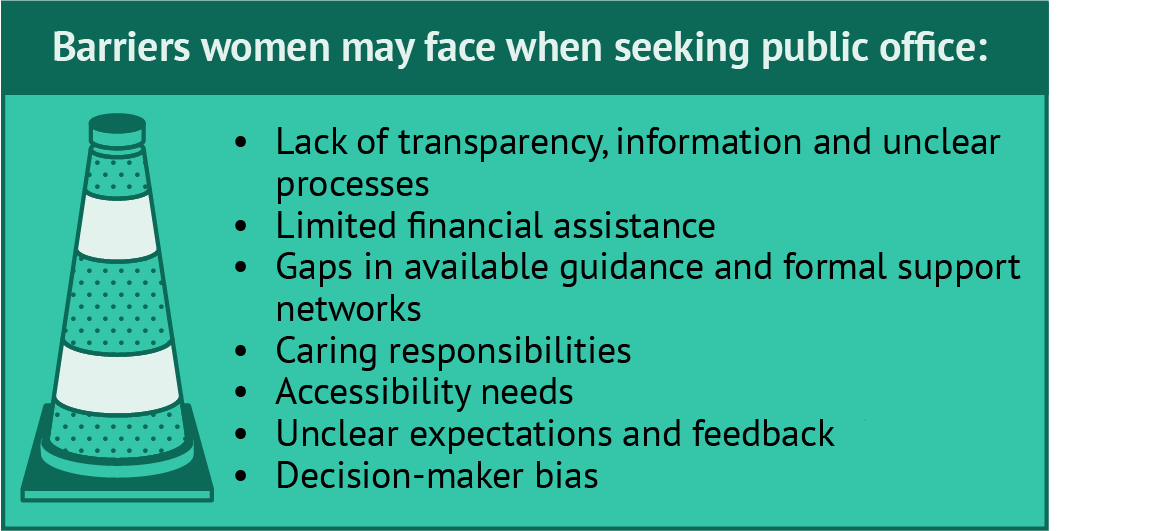 Consistent use of positive action tools leads to better representation, but tokenism, cultural resistance, and lack of intersectionality continue to hold us back. From social media abuse to internal party resistance, the barriers are systemic and deeply entrenched. Yet, women also spoke of passion, purpose, and the drive to make politics better—not just for themselves, but for those who come after.
Consistent use of positive action tools leads to better representation, but tokenism, cultural resistance, and lack of intersectionality continue to hold us back. From social media abuse to internal party resistance, the barriers are systemic and deeply entrenched. Yet, women also spoke of passion, purpose, and the drive to make politics better—not just for themselves, but for those who come after.
Drawing on data from three election cycles (Holyrood 2021, Scottish Local Elections 2022, and UK General Election 2024), alongside survey responses from 159 women and 15 in-depth interviews, the report provides a detailed analysis of how PAMs have shaped women’s political representation in Scotland.
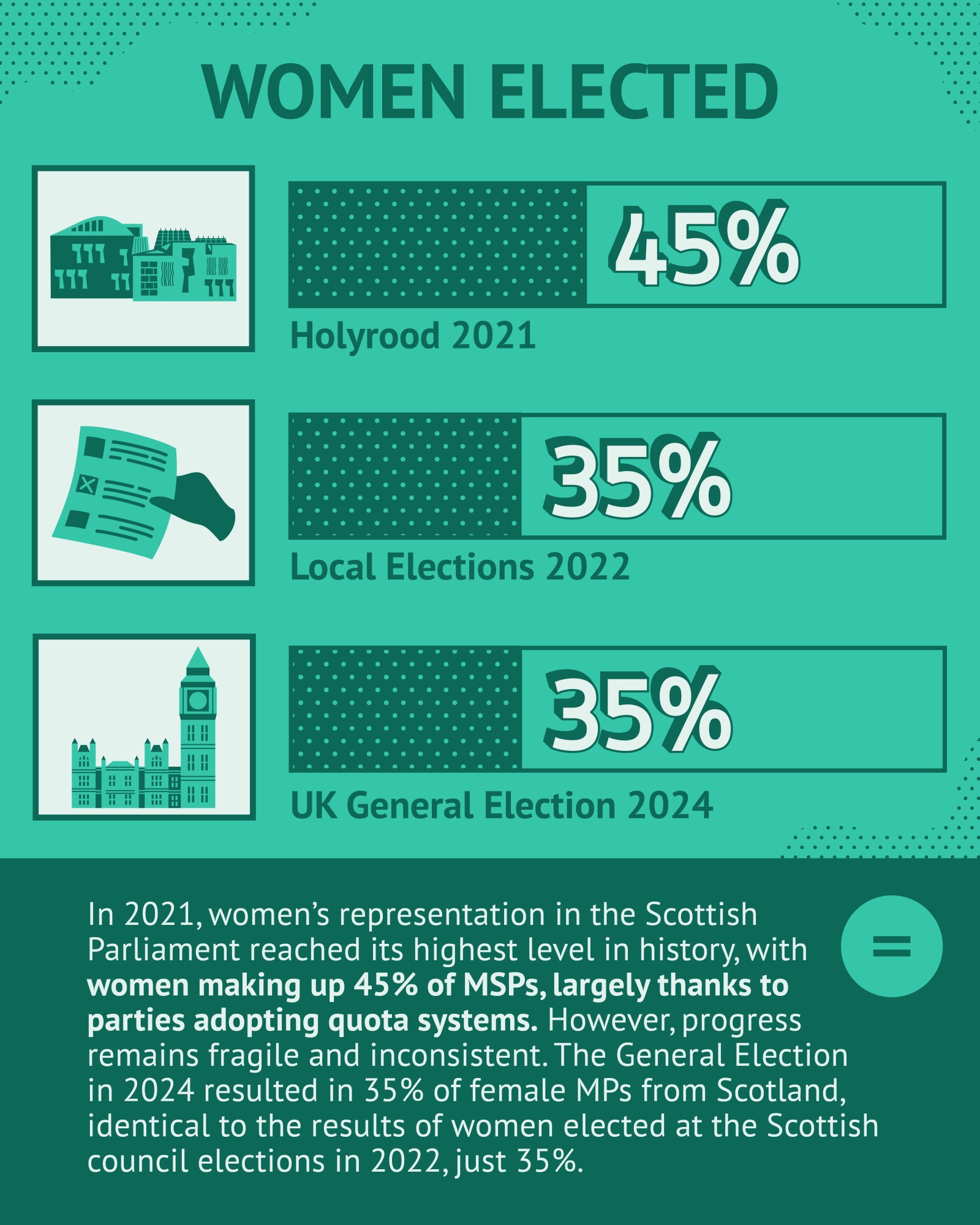 Quotas and PAMs are effective tools: The consistent use of PAMs correlates with higher levels of women’s representation. In 2021, women made up 45% of MSPs - the highest in Scottish Parliament history -largely due to quota use. However, this progress is fragile: women made up only 35% of Scottish MPs in the 2024 General Election and 35% of councillors in 2022, where PAMs were inconsistently applied.
Quotas and PAMs are effective tools: The consistent use of PAMs correlates with higher levels of women’s representation. In 2021, women made up 45% of MSPs - the highest in Scottish Parliament history -largely due to quota use. However, this progress is fragile: women made up only 35% of Scottish MPs in the 2024 General Election and 35% of councillors in 2022, where PAMs were inconsistently applied.
- No party has achieved gender parity across all levels of government, and the underrepresentation of Black and minority ethnic, disabled, and younger women remains stark.
- Inconsistent application of PAMs leads to regression.
- Labour and the Greens have a stronger track record with all-women shortlists, zipping and twinning, but remain inconsistent on a local level.
- The SNP increasingly uses PAMs and has attempted to support disabled and minority ethnic candidates specifically, but the approach is not as consistent as necessary or is often applied in unwinnable seats.
- The Liberal Democrats’ approach to implementing gender-balancing quotas has been mixed. Without a consistent framework, it heavily relies on individual internal champions.
- The Conservatives often demonstrate opposition to quotas. However, some members are critical of this attitude and wish for internal reform.
The evidence is clear: PAMs work, but only when applied consistently, strategically, and with a commitment to intersectionality, focusing on Black and minority ethnic, disabled and young women. Together, we can make politics a place where all women belong.
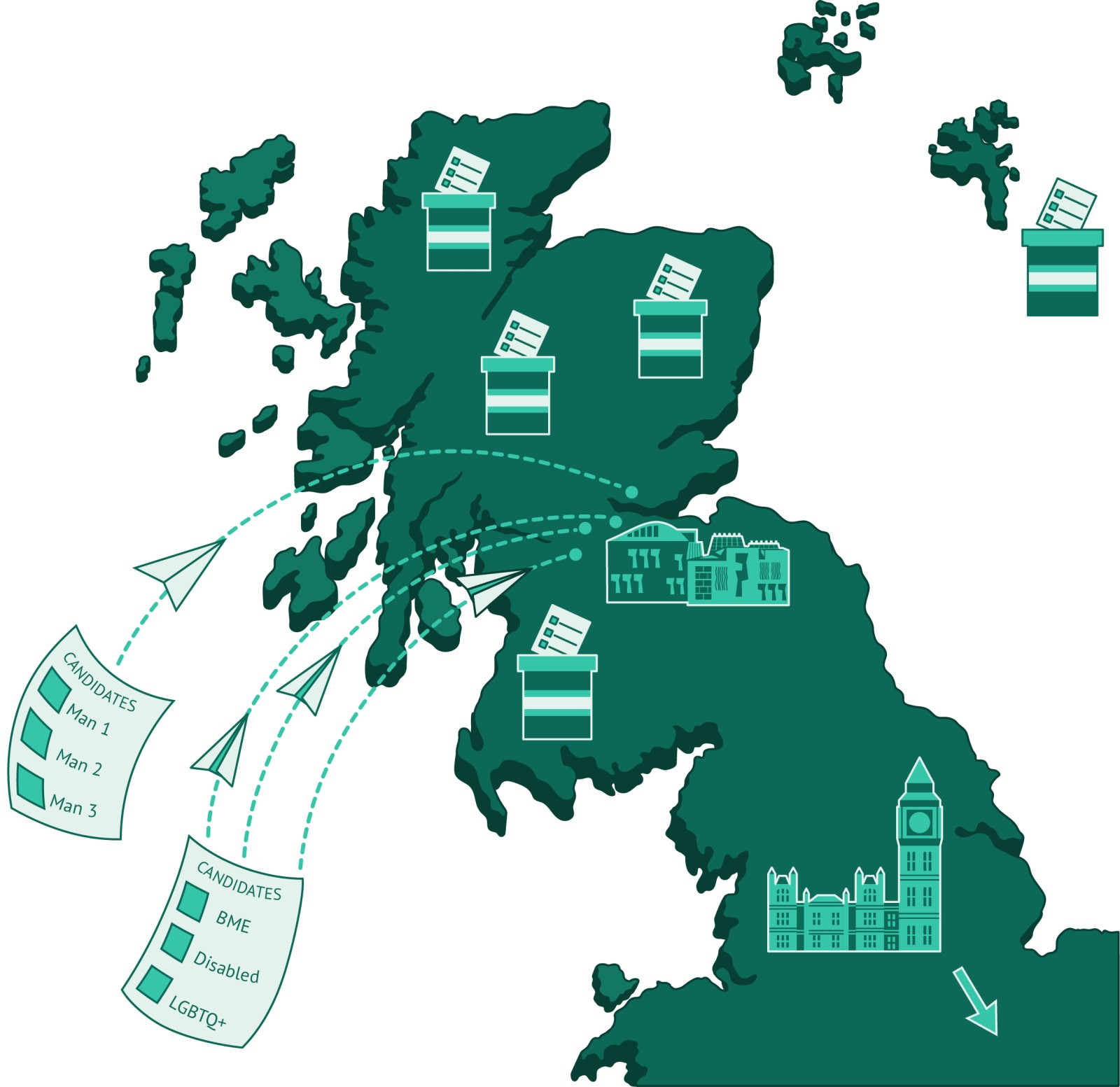 Equal Representation Development Officer Noomi Anyanwu states:
Equal Representation Development Officer Noomi Anyanwu states:
“As Scotland approaches the 2026 and 2027 elections, political parties face a critical opportunity to embed meaningful change. Without action, recent gains risk being reversed.
Some cross-cutting challenges when it comes to the application of positive action measures (PAMS) include tokenistic use of PAMs, cultural resistance within parties to their application, lack of intersectional approaches, the importance of local politics and legal uncertainty.
The women we talked to told us that representation matters. That support networks matter. That visibility matters. And that change is not only necessary—it’s urgent.”
Read the full report including vital recommendations for action here.
Before the Ballot - Why Candidate Assessment is a crucial step on the journey to more equal representation in politics
With partners in the Equal Representation Coalition, Engender is launching a brand new chapter of the Equal Representation in Politics Toolkit focusing on Candidate Assessment. Ahead of the Scottish Parliament and Local Council elections in 2026 and 2027, now is the time for parties to review how aspiring candidates gain approval to stand if we're to see more diversity on the ballot. Our Development Officer for Equal Representation, Jessie Duncan, explains how the new Toolkit chapter can help.
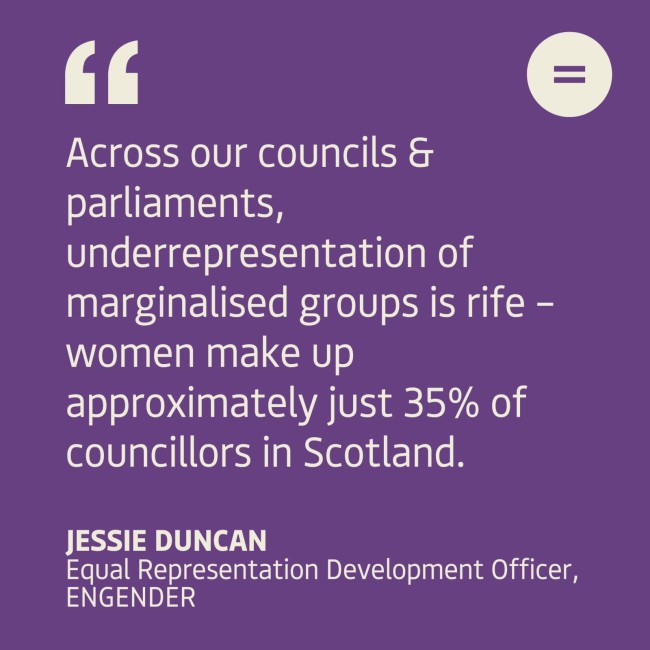
Before the ballot
When we think about how to make councils and parliaments more representative of the communities they serve, we normally think about elections. How do we elect more women, more minority ethnic people, more disabled people and more LGBTI people? The ultimate decision about who makes it off the ballot and into our councils and parliaments, of course, rests with voters. But in reality, so much about elections is already decided long before polling day. Parties largely have control over who makes it onto the ballot, with many decisions taken in the months and years leading up to election day, shaping the outcome before any votes have been cast.
Parties decide who becomes a candidate through the process of candidate selection. Selection is where the party decides on who from a list of nominees will become the party candidate at the upcoming election. There is a lot of evidence showing the positive impact that using different policies, such as voluntary quotas during selection, can have on the diversity of elected representatives. However this is only useful if there is a diverse pool of potential candidates available to choose from.
Candidate assessment and discrimination
Not just anyone is allowed to put themselves forward for selection - aspiring candidates will usually have to gain the party's approval. This process is known as candidate assessment (sometimes called vetting, screening or shortlisting), and it is at this stage that the first decisions about who our elected representatives will be are taken. Processes vary but usually involve some combination of written application form, an interview with a panel , and might include a test before a final decision is made. Some parties might use these stages to filter, and just like any recruitment process, without consideration of how to combat discrimination and to ensure equal access, candidate assessment risks stifling a more equal, representative politics right at the outset.
Chronic underepresentation – It's not good enough
Unfortunately, no robust data that would tell us about the protected characteristics of our elected representatives is published at the moment, but what we do know tells us that across our councils and parliaments, underrepresentation of marginalised groups is rife – for instance, women make up approximately just 35% of councillors in Scotland, and it took until 2021 for the first two women of colour to be elected to the Scottish Parliament. This kind of chronic underrepresentation benefits no one – we know that when there is meaningful diverse representation, better decision-making follows. Parties have a tremendous responsibility to their membership and to the communities they seek to serve to ensure that candidate assessment processes do not enable and reward only those whose experiences and pathways to politics conform to an outdated status quo of what makes a politician – because it's clear that the status quo is broken.
What will help?
While progress on increasing diversity is often focused on electoral outcomes, to ensure that progress at the ballot box is sustainable, it's essential to look at all stages of the journey and to invest in developing a strong, diverse pipeline of future candidates. This means considering how potential candidates are developed, supported and assessed. As well as being a responsibility, this offers parties a huge opportunity to put into practice often-stated principles when it comes to building a fairer, more equal society.
Parties must ask themselves:
-
What qualities and experiences do we want to see more of in public life?
-
Is the way we assess potential candidates perpetuating inequality?
-
Are our values as a party reflected in the candidates that we approve to stand?
-
Are we meeting our legal duties to ensure a fair and open process under the Equality Act?
To help answer these questions, we're launching a new chapter of the Equal Representation Toolkit, focused on Candidate Assessment. The chapter is aimed primarily at party members and staff who are involved in assessing candidates or in designing assessment processes. Guidance is given on how to run an inclusive and accessible candidate assessment approach that enables people from a wider range of backgrounds to succeed. This includes looking at things like how to advertise and raise awareness of the assessment process; providing equalities training for people involved in assessment; valuing diverse experience; and how to provide constructive feedback and ongoing support for unsuccessful applicants.
As with the rest of the Toolkit, users are invited to take a self-assessment quiz and receive a bespoke action plan highlighting areas for reflection and recommendations for improvement. The Toolkit is easy-to-use and each chapter takes no more than 5 minutes. We can also offer workshops and 1-2-1 support – please get in touch with us if you're interested.
While all attention may be focused on campaigning for the General Election, it's essential to remember what comes next. We are currently 2 and 3 years out from the next Holyrood and local council elections, but it is likely that the processes which will shape these results will begin much sooner. Candidate assessment is the first in a chain of decisions that determine who our elected representatives will be. It's up to parties to make sure that hopes for greater equality in our democracy are built on strong foundations – starting with asking who is given the chance to be on the ballot.
GUEST POST: Critically minded? The problem of diversity in film criticism
Engender and the Equal Media and Culture Centre for Scotland have hosted student placements from the MSc in Social Research at the University of Edinburgh and the University of Strathclyde Applied Gender Studies and Research Methods course. As part of their research outputs, the students have produced a series of blogs.
In this post, Alex highlights the need for an intersectional approach to examining our cultural data and why we need more diverse voices in film criticism.

Film criticism fulfils multiple purposes. People read film reviews for suggestions on what to watch, and whether it’s worth shelling out to go to the cinema.
As a result, film reviews are also tied to a film’s financial success, its consideration for awards and whether it gets a wide release at all. Thus, critics can become “gatekeepers,” defining what counts as “good” art.
Guest Post: Mainstreaming Spotlight - Scottish Women's Budget Group
To mark the release of Engender's new report, What Works for Women: Improving gender mainstreaming in Scotland, we're sharing how mainstreaming is important to the work of some of Scotland's equalities organisations. Here, Sara Cowan from the Scottish Women's Budget Group talks about how mainstreaming is a vital component of creating a gender equal economy.
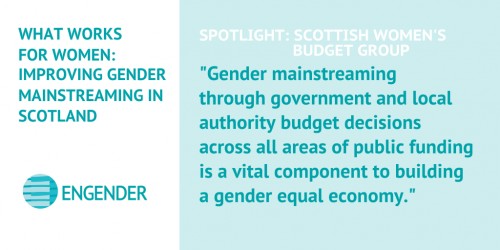
Why is gender mainstreaming important to your organisation?
Women and men use public services differently – they have different life experiences and face different economic realities and challenges. Women are often disadvantaged by policies that do not recognise these different experiences. Gender mainstreaming is important to us to redress this balance when decisions are made across a range of public services.
What area(s) of mainstreaming are you focused on?
We’re concerned with how public finances are spent and how budgetary decisions can work to reduce gender inequality. Gender mainstreaming through government and local authority budget decisions across all areas of public funding is a vital component to building a gender equal economy.
If you could snap your fingers and change one thing to make gender mainstreaming happen, what would it be?
Comprehensive equality impact assessments would be conducted for all budgetary decisions by local and national Government.
Where can people find out more about your work on mainstreaming?
Find out more about our work and become a member online here. We're also hosting two 'Introduction to Gender Budgeting' webinar sessions, one on 10th December from 9.30am-11.30am, and another on 15th December from 7pm-9pm - you can sign up for whichever session works best for you here.
Guest Post: Mainstreaming Spotlight - CRER
To mark the release of Engender's new report, What Works for Women: Improving gender mainstreaming in Scotland, we're sharing how mainstreaming is important to the work of some of Scotland's equalities organisations. Here, Carol Young from the Centre for Racial Equality and Rights (CRER) talks about how they use an intersectional approach in their mainstreaming work.
Why is gender mainstreaming important to your organisation?
While CRER is an anti-racist organisation and our work is primarily focused on race equality, we adopt an intersectional approach where possible. People’s identities are multifaceted, and everyone has multiple protected characteristics, so it's not feasible to get mainstreaming right for one characteristic without considering the others.
-500.png)
What area(s) of mainstreaming are you focused on?
We focus on all aspects of mainstreaming, with particular attention to race. We produce guidance for public bodies on the Public Sector Equality Duty (PSED), which includes mainstreaming activity. We previously delivered an in-depth Mainstreaming Equalities Organisational Development Programme for voluntary sector leaders, along with our partners at GCVS.
If you could snap your fingers and change one thing to make gender mainstreaming happen, what would it be?
We would want public bodies to have a better evidence base and to use the evidence they gather in mainstreaming equality. If public bodies produced detailed intersectional data, this would aid identification of gaps in equality mainstreaming and allow targeted interventions. Inequalities for minority ethnic women are worse than for minority ethnic men on most issues, but the situation varies widely between different ethnicities. The more detail, the better!
Where can people find out more about your work on mainstreaming?
You can find out more about our work on mainstreaming by looking at the publications section on our website. We also maintain a PSED portal which outlines the reports and data published under the public sector equality duties by public bodies in Scotland.
Downloads
 Engender Briefing: Pension Credit Entitlement Changes
From 15 May 2019, new changes will be introduced which will require couples where one partner has reached state pension age and one has not (‘mixed age couples’) to claim universal credit (UC) instead of Pension Credit.
Engender Briefing: Pension Credit Entitlement Changes
From 15 May 2019, new changes will be introduced which will require couples where one partner has reached state pension age and one has not (‘mixed age couples’) to claim universal credit (UC) instead of Pension Credit.
 Engender Parliamentary Briefing: Condemnation of Misogyny, Racism, Harassment and Sexism
Engender welcomes this Scottish Parliament Debate on Condemnation of Misogyny, Racism, Harassment and Sexism and the opportunity to raise awareness of the ways in which women in Scotland’s inequality contributes to gender-based violence.
Engender Parliamentary Briefing: Condemnation of Misogyny, Racism, Harassment and Sexism
Engender welcomes this Scottish Parliament Debate on Condemnation of Misogyny, Racism, Harassment and Sexism and the opportunity to raise awareness of the ways in which women in Scotland’s inequality contributes to gender-based violence.
 Gender Matters in Social Security: Individual Payments of Universal Credit
A paper calling on the Scottish Government to automatically split payments of Universal Credit between couples, once this power is devolved to the Scottish Parliament.
Gender Matters in Social Security: Individual Payments of Universal Credit
A paper calling on the Scottish Government to automatically split payments of Universal Credit between couples, once this power is devolved to the Scottish Parliament.
 Gender Matters Manifesto: Twenty for 2016
This manifesto sets out measures that, with political will, can be taken over the next parliamentary term in pursuit of these goals.
Gender Matters Manifesto: Twenty for 2016
This manifesto sets out measures that, with political will, can be taken over the next parliamentary term in pursuit of these goals.
 Scottish NGO Briefing for UN Special Rapporteur on Violence Against Women
Joint briefing paper for the UN Rapporteur on Violence Against Women.
Scottish NGO Briefing for UN Special Rapporteur on Violence Against Women
Joint briefing paper for the UN Rapporteur on Violence Against Women.

Newsletter
Sign up to receive our newsletter here:
Sign up to our mailing list
Receive key feminist updates direct to your inbox: